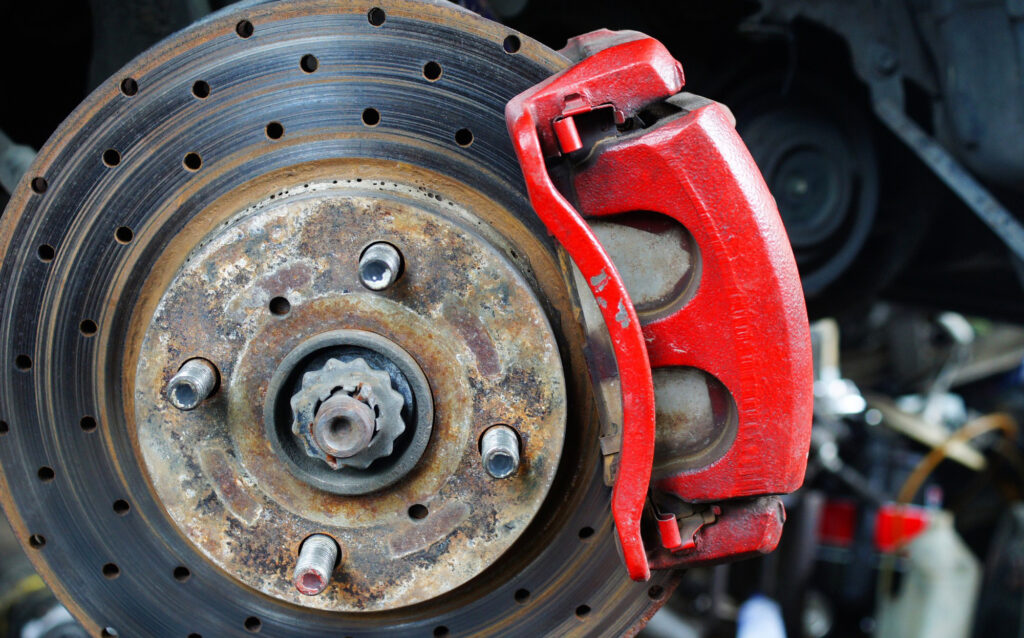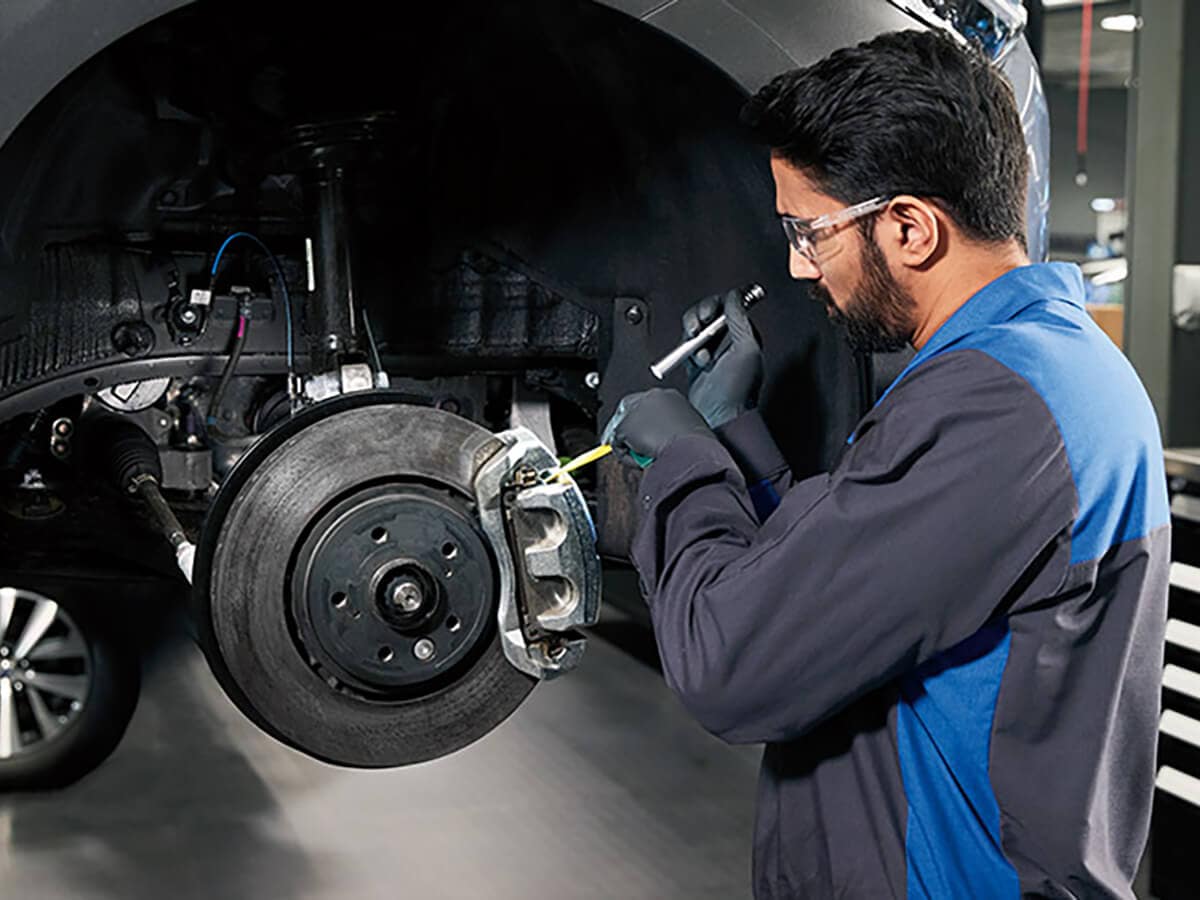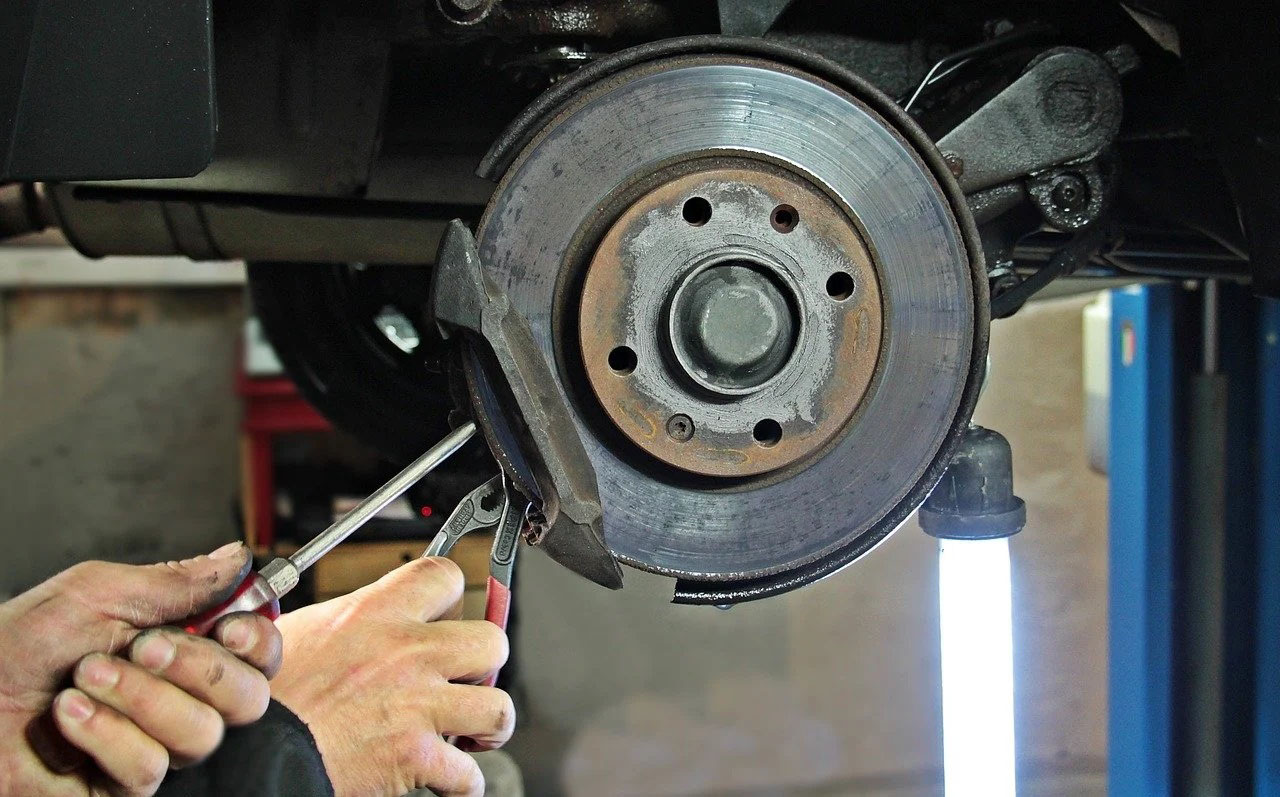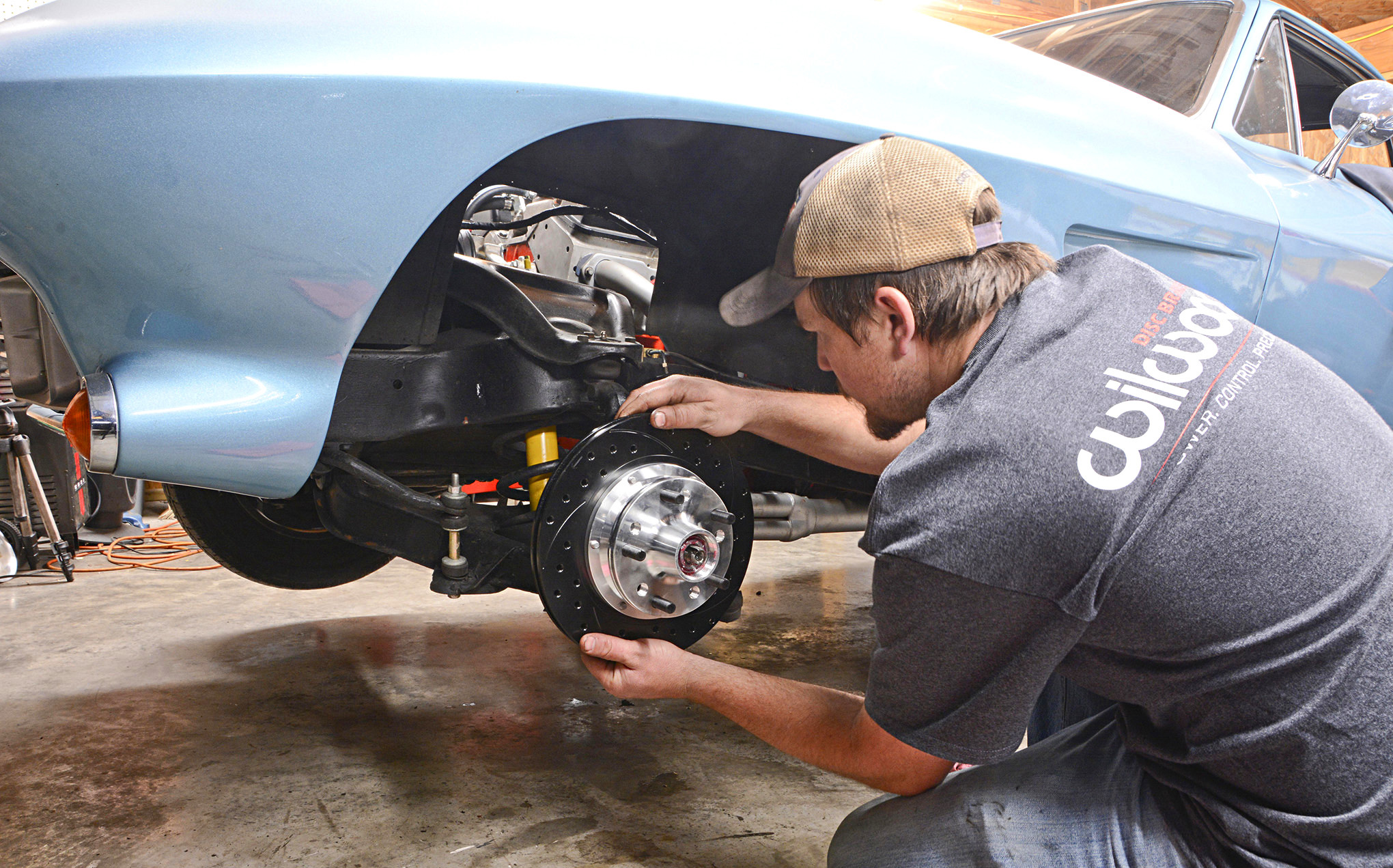You might be worried if your car brake lock happens. This issue stops your vehicle from moving safely. Our article shows you how to unlock brakes and regain vehicle control. Keep reading for safety tips.
Table of Contents
ToggleCommon Causes of Brake Lock-Up
Brakes can lock up due to frozen caliper parts or wheel mechanisms. Problems like overheated brakes, ABS issues, or dirty brake fluid also cause trouble.
Seized Calipers or Wheel Cylinders
Seized calipers or wheel barrels stop your brake system from working right. Calipers push the brake pads against car wheels when you hit the brake pedal. But if they’re stuck, your car won’t slow down as it should.
Dirt, rust, and not using the car for a long time can cause this problem.
To fix seized calipers or wheel barrels, you might need to replace them or clean them up. Check these parts often to avoid sudden brake lockup while driving. Regular checks are part of preventing brake locking and keeping your drive safe.
Overheated Brakes Leading to Fluid Expansion
Overheated brakes can cause big problems. This happens when your car’s stoppers get too hot, often from lots of use on steep roads or in heavy traffic. The heat makes the brake fluid expand.
Think of it like water boiling over a pot; when it gets too hot, it has to go somewhere.
Heat does not forgive; it changes everything.
This change can lead to your brakes locking up unexpectedly. It’s because the expanded fluid puts more pressure on your brake parts than normal. Imagine squeezing a balloon too hard – at some point, something has to give.
In cars, this means your wheels might not turn as they should, making it hard to steer.
When dealing with such issues, handling locked brakes while driving becomes crucial for safety. Emergency procedures suggest easing off the gas and avoiding sudden stops can help manage an unexpected lock-up situation.
ABS Malfunctions or Faulty Brake Lines
ABS malfunctions and bad brake lines can cause big trouble. If the ABS, or anti-lock braking system, isn’t working right, your brakes might lock up during emergency stops. This happens because the ABS helps control the pressure to each wheel to stop you safely.
Think of it as your car’s way to keep grip on the road while stopping fast.
Faulty brake lines are another issue. These lines carry brake fluid under high pressure when you hit the pedal. If there’s a leak or blockage, that pressure drops. Then, your car won’t stop as it should.
I learned this first-hand when my old car’s brake line burst mid-drive — sudden pedal floor touch with no slowing down was scary! Regular checks help avoid such situations, keeping you safer by ensuring everything works as expected.
Contaminated Brake Fluid
Contaminated brake fluid causes big problems for your car’s braking system. Water gets into the fluid over time. This lowers its boiling point. When you use your brakes a lot, like on long drives downhill, the heat makes the water in the fluid boil.
Boiling creates gas bubbles in your brake lines. Your brakes feel spongy and may not work well.
To fix this issue, you need to flush out the old fluid and replace it with new, clean brake fluid. This process removes water and dirt from your braking system. Regular checks of your brake fluid can prevent contamination.
Make sure to change it as advised by your car’s manual or mechanic. This keeps your brakes working right and helps avoid locking up while driving.
Immediate Actions to Take When Brakes Lock Up
If your brakes lock up, keep cool and slowly let go of the brake pedal to regain control. Read on for more tips on handling this scary situation.
Stay Calm and Avoid Panic Braking
Keeping your cool matters a lot when brakes lock up. Panic braking can make things worse by reducing your control over the vehicle. Instead, take a deep breath and focus on what you need to do next.
This helps you think clearly and act wisely.
If you lose your head, you lose the race.
Slowly lift your foot off the brake pedal rather than pushing down harder. This action allows locked wheels to start rolling again, giving back some steering control. It’s key for handling locked brakes while driving safely to a stop or moving out of traffic.
Steering plays a big part here too. With regained control, gently steer in the direction you want to go. Steering helps avoid obstacles and keeps you on course until it’s safe to fully stop or drive slowly off the road.
Anti-lock brakes (ABS) are there for situations like this, preventing wheel lock-up before it happens. Understanding how ABS works can prepare you for unexpected stops without panicking.
Short sentences keep instructions clear in stressful moments, making them easier to follow during sudden brake lock-ups.
Gradually Release the Brake Pedal
Ease off the brake pedal slowly if your brakes lock up. This action gives you control again and helps avoid skidding. It feels natural to push harder on the brake when you panic, but that only makes things worse.
Instead, lifting your foot gently lets each wheel start rolling again which means you can steer.
From my own experience, I learned this method works best during a scare on a wet road. As soon as I stopped pressing down hard and eased up instead, my car began to respond. This technique is crucial for handling locked brakes while driving safely back to control.
Downshift to Lower Gears to Slow the Vehicle
Shifting to lower gears helps slow your car without using brakes. This technique is key when your brakes lock up while driving. It uses engine braking to reduce speed. Simply shift one gear down at a time if you’re in a manual transmission vehicle.
For automatic cars, use the L (Low) or numbered positions to achieve this slowdown.
I learned this method from an experienced driver years ago during an emergency where my brakes failed. First, I shifted down slowly, feeling the car’s response with each lower gear.
This control allowed me to steer safely off the road without panic braking. Try practicing in a safe area to get used to how it feels before you need it on the road.
Steer Safely to the Side of the Road
Keep your hands firm on the wheel. Look for a safe place to move your car off the road. Make this move slowly and carefully. Use your turn signals to let others know where you’re going.
This helps avoid sudden moves that could make things worse.
You’ve felt it before, perhaps on an icy day or when something ran onto the road. The first goal is to not hit anything or stop traffic flow. As you steer to safety, keep checking around you.
Other drivers might not expect your slow speed or sudden need to pull over. Keeping calm and using what you know will get you safely parked at the roadside, ready for the next steps in fixing your brakes.
How to Troubleshoot Brake Lock-Up
To find out why your brakes lock up, start by looking at the brake calipers. Check if they stick. Next, see if the brake fluid is low or dirty. These steps help you fix the problem fast.
Inspecting the Brake Calipers for Sticking
Check the brake calipers to see if they stick. Faulty calipers can make brakes lock. Look for signs of wear and tear or damage on them. You need tools like a flashlight and gloves for safety.
If calipers don’t move freely, they might be stuck.
Always visually check your brakes if you think they’re locked up.
You should also feel the temperature of the wheels after driving. Hotter wheels mean there’s likely an issue with sticking calipers since they cause more friction. Bring your car to a stop safely, then touch near the wheel but not directly to avoid burns.
Checking Brake Fluid Levels and Condition
Look at the brake fluid reservoir to check its level and color. The reservoir is usually see-through, with marks for “min” and “max”. Your fluid should be between these marks. If it’s low, you need to add more brake fluid.
The color tells you about the condition. New fluid looks clear or slightly yellow. Dark or dirty fluid means it needs a change.
Use a cloth to clean around the cap before opening it; this keeps dirt out. Open the cap carefully and look inside. Add quality brake fluid if it’s below the “min” mark. Don’t mix different types of fluids; they might not work well together.
After checking or adding fluid, put the cap back on tight to avoid leaks.
Diagnosing ABS Sensor Issues
To find out if your ABS sensor is the reason your brakes lock up, you need to check it. An ABS sensor, or anti-lock brake system sensor, tells your car’s computer how fast the wheels are spinning.
If this sensor goes bad, it can cause brake issues. You’ll use a diagnostic tool to read codes from your car’s computer. These codes can tell if there is a problem with the ABS sensor.
I had to learn this firsthand when my own car’s brakes locked up unexpectedly. I used an OBD-II scanner, a tool that reads information from cars made after 1996. The scanner showed me error codes that pointed to the ABS sensor as the issue.
After replacing the faulty sensors and clearing the codes with the scanner, my brakes worked fine again without locking up during driving.
Identifying Heat-Related Lock-Up Symptoms
Brakes get very hot when they work too hard. This heat can make them lock up. You might smell something burning or see smoke from the wheels. These are signs your brakes are too hot.
The brake pedal might also feel different when you press it.
To spot these problems, check if the brakes make a loud noise or if the car pulls to one side when you try to stop it. These could mean your brakes need help because of the heat. Look for leaks around the brakes too.
If you see fluid on the ground near a wheel, this could be brake fluid that got too hot and leaked out.
How to Fix the Problem After a Lock-Up
Fixing locked brakes starts with finding what went wrong and then making the right fixes. You might need to replace sticky brake parts or clean out bad brake liquid.
Lubricating or Replacing Sticking Calipers
First, check if your calipers stick. Sticking calipers make brakes lock up. Use a proper tool to see if they move freely. If not, they need grease or a new part.
To fix this, you might have to lubricate or change them. For lubrication, use brake grease on the slides and pins. This helps parts move smoothly. If lubricating doesn’t work, get new calipers.
Installing new ones ensures everything works right and stops brake lock-up.
Use quality parts for replacement to avoid future problems. Always ensure brakes are well-maintained to prevent issues while driving.
Flushing Contaminated Brake Fluid
Flushing contaminated brake fluid is key to fixing brakes that lock up. This process gets rid of old, dirty fluid that can cause problems. You need a hose and a clean container to catch the old fluid.
Your car’s manual will show where to find the brake bleeder valve. Open it, then press the brake pedal to push out the bad fluid.
Always use new, quality brake fluid when refilling.
I learned this technique works well after my brakes locked during a trip. It was scary, but changing the bad fluid made a big difference. Make sure you fill up with fresh fluid correctly to keep your brakes working right.
Repairing or Replacing Faulty ABS Components
Fixing or swapping out broken ABS parts is key if you have brake lockup. First, check the ABS sensors. These gadgets tell your car’s computer about wheel speed. If they’re dirty or broken, they can cause problems.
Clean them with care or replace them if they are beyond repair. Next, look at the ABS module – the brain of the system. It might need reprogramming or replacing if it’s not working right.
You also need to inspect the wires and connections that link these parts to your car’s electrical system. Loose or damaged wires can lead to issues with your brakes’ anti-lock performance.
Sometimes just securing a loose connection solves the problem without needing new parts.
I once had to replace an ABS sensor on my own car after noticing signs of brake lockup during drives in wet weather. After swapping out the faulty sensor with a new one, I noticed an immediate improvement in how my car handled braking in difficult conditions.
Keep these steps in mind for repairing or replacing faulty anti-lock brake (ABS) components: Check sensors, assess ABS module status, secure all wiring connections properly, and consider professional help for complex fixes.
Preventing Brake Lock-Up in the Future
To stop brakes from locking up again, focus on keeping your car’s brake system in top shape. This means doing regular checks and swaps of brake fluid and making sure all parts are working right.
Regular Brake System Maintenance
Check your brake system often to prevent lock-up. This means looking at the brake pads, rotors, and fluid levels regularly. Change the brake fluid every two years to stop water from causing rust inside.
Also, make sure the brake lines are clear and not leaking.
Regular checks keep brakes working right and help avoid sudden lock-ups.
Use quality parts when replacing anything in your brake system. Cheap parts wear out faster and can cause more problems. Keep an eye on how your car drives. If it pulls to one side or if the pedal feels soft, have a professional look at it soon.
Using High-Quality Brake Fluid
Using high-quality brake fluid is key to preventing lock-ups. This fluid acts as a messenger in your car’s braking system. When you push the pedal, it sends force to the brakes, slowing down your car.
But not all brake fluids work the same way. Some handle heat better than others. During quick stops or in hot weather, brakes get very hot. If your fluid can’t take this heat, it might cause problems like lock-up.
To keep your brakes working well, pick a top-notch fluid that resists heat and does not absorb water easily. Brands matter here; some are known for making fluids that protect against moisture and temperature changes better than others.
Changing this fluid regularly also helps avoid trouble by getting rid of any dirt or water that could hurt how your brakes work.
Properly Bleeding and Flushing Brake Lines
Bleeding and flushing brake lines is key to preventing lock-up. You need a wrench, a clean jar, and fresh brake fluid. Start by finding the bleeder valve on each brake. Attach a tube to this valve and put the other end in the jar.
Have someone press the brake pedal while you open the valve. Fluid will come out into the jar. Do this until you see clean fluid with no air bubbles.
Next, fill your system with new fluid. Make sure to check your car manual for the right type of fluid. This process makes sure that old, dirty fluid doesn’t cause problems like lock-up or slow brakes response time during driving upgrades such as better suspension or traction control enhancements for safety in all weather conditions.
When to Seek Professional Help
Seek help from a mechanic if brakes keep locking after trying simple fixes, or if you face complex issues with your car’s ABS or main brake cylinder. Keep reading for more details on handling brake lock-up.
Persistent Lock-Up Issues After Basic Repairs
If your brakes keep locking up even after you’ve tried fixing them, it’s time to check things more closely. You might need a pro to look at the anti-lock brake system (ABS) or the main brake control.
These parts can get tricky. Sometimes, DIY fixes miss hidden problems. A mechanic has tools that find issues we can’t see.
You’ve done what you could, like changing fluids and checking pads. But if brakes still lock during normal drives, don’t wait. Complex ABS puzzles or big issues with the main control often cause repeat lock-ups.
Get help soon to avoid risky situations on the road. Mechanics use special scanners to spot trouble in these systems fast. Your safety is key when driving, and clear brakes are part of that safety plan.
Complex ABS or Master Cylinder Problems
Addressing ABS or master cylinder issues calls for precise steps. The ABS, or anti-lock braking system, aids in preventing tires from locking during strenuous brakes. The master cylinder administers the circulation of brake fluid.
Both play pivotal roles for secure stops. If these parts malfunction, your car might not halt correctly.
Gaining insights from checking the ABS means scanning for error codes with a tool. This provides insight into the issue. You may need to substitute a malfunctioning sensor or component on occasion.
For the master cylinder, keep an eye out for indications of leaking fluid or struggle when applying the pedal. It may require a replacement or leak repairs.
Keep in mind, tackling these issues can be demanding. It’s beneficial to comprehend why brakes lock and how systems collaborate for safety on streets.
If Brake Lock-Up Occurs Repeatedly During Normal Driving
You need professional help if your brakes lock up a lot. This means the problem is too big for simple fixes. A mechanic can find out why it keeps happening. They use tools like scanners to check the brake system and ABS for problems.
They also test the brake fluid and lines to see if they are okay.
From my own experience, getting an expert early saves you both time and money in the long run. I waited too long once, and it led to bigger repairs than if I had just gone in right away.
Take your car in as soon as you notice repeat issues with locking brakes during normal drives.
Conclusion
Knowing what to do when brakes lock up keeps you safe. First, learn the reasons they lock, like stuck calipers or bad brake fluid. If brakes lock, stay calm and try to slow down safely.
Fixing this can mean checking parts or changing fluids. Keep your car in good shape to avoid future problems. Get help if issues keep happening. This way, you’re ready for anything on the road.
FAQs
What immediate actions should I take when my brakes lock up?
When your brakes lock, it’s crucial to stay calm and avoid panic. Carefully remove your foot from the brake pedal and steer in a safe direction until you regain control of the vehicle.
Why do brakes lock up while driving?
Brakes may lock due to various reasons such as faulty brake components or extreme weather conditions. It is essential to understand why this occurs to prevent future incidents.
Are there techniques I can use if my brakes lock up while driving?
Yes, one technique is pumping your brakes gently if they begin to lock up. This method helps maintain some degree of control over the vehicle during an unexpected situation.
Can upgrades help prevent my car’s brakes from locking up?
Absolutely! Upgrades like anti-lock braking systems can significantly reduce the chances of experiencing brake lock-up, ensuring safer driving conditions even under adverse situations.




